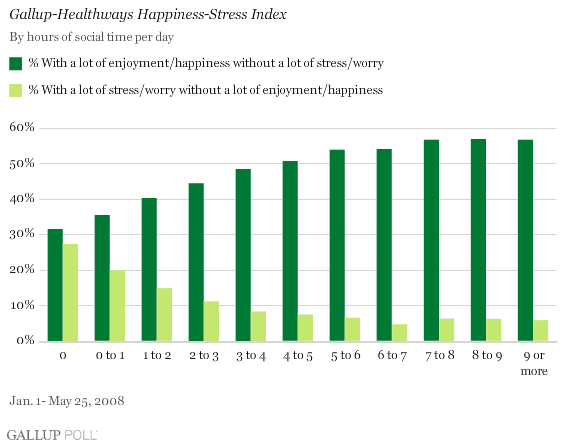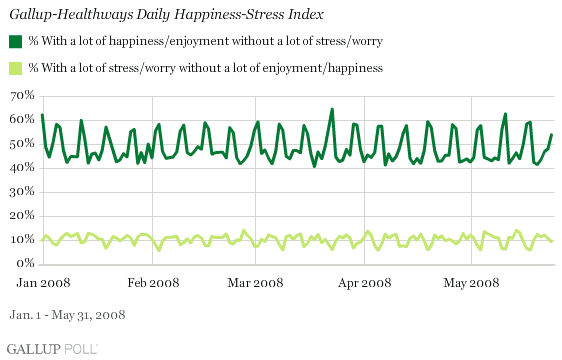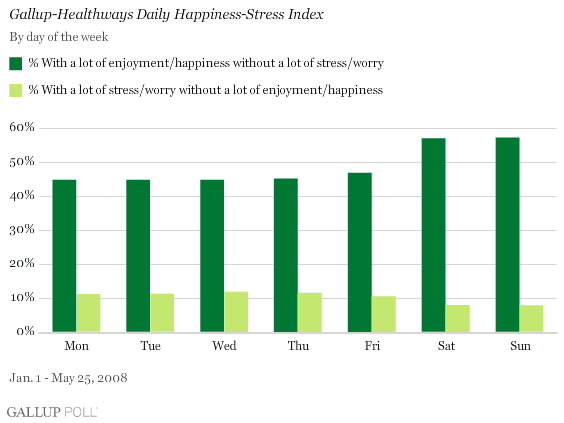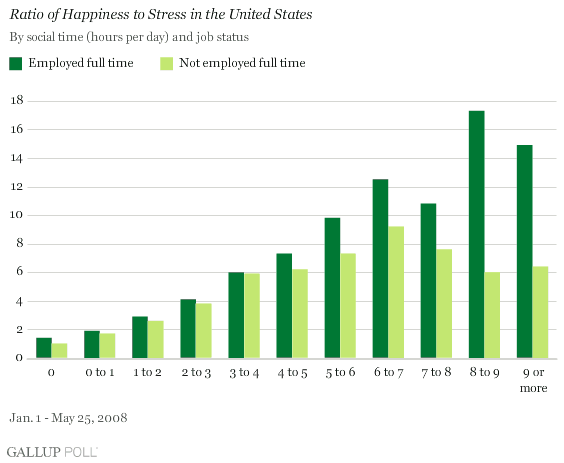WASHINGTON, D.C. -- Findings from the Gallup-Healthways Happiness-Stress Index underscore the crucial role of spending time with friends and family in determining the daily emotional well-being of the American public.

On an average day, 49% of Americans experience a lot of happiness and enjoyment without a lot of stress and worry, while 10% say they experience daily worry and stress that far outweighs their happiness and enjoyment. Weekends/holidays and social time are two major factors that best explain daily fluctuations in the Happiness-Stress Index. Weekends/holidays and social time combined account for as much as 87% of the day-to-day changes in the Happiness-Enjoyment Index and 60% of the daily changes in the Stress-Worry Index for the first five months of 2008 studied so far.
Of the more than 140,000 Americans Gallup-Healthways has surveyed so far, the individuals who report being alone all day (zero hours of social time) perform the poorest on the Happiness-Stress Index, with only 32% experiencing much enjoyment/happiness and nearly as many experiencing intense stress and worry (27%). This results in a happiness-stress ratio of 1-to-1. The reverse is true for those who devote a large part of their day to social time, with the happiness-stress ratio rising for each additional hour of time spent socializing up to six to seven hours -- at which point the happiness-stress ratio peaks. Among those who report spending six to seven hours of social time with family and friends on any given day, those experiencing a lot of enjoyment and happiness (54%) outnumber those experiencing extreme stress and worry (5%) by a ratio of 12-to-1.
The Weekend Effect
The trendline of the Happiness-Stress Index also reveals a distinct pattern of peaks and valleys for each measure corresponding to weekends and weekdays. Feelings of happiness and enjoyment peak on weekends, and, in symmetry, feelings of stress and worry also register lows on weekends before beginning to climb up again once the week begins.

In fact, the so-called "weekend effect" is unmistakable in the first five months of 2008. With the exception of New Year's Day, on every day of the year, as measured by this index, Americans say they have more enjoyment/happiness on weekends than on weekdays.
Quantifying the average Happiness-Stress Index by day of the week also reveals a typical uptick in feelings of enjoyment/happiness over the weekend, with the percentage of Americans who are experiencing enjoyment/happiness increasing from 45% on weekdays to 57% on weekends.

The days of the year when the majority of Americans experience enjoyment/happiness also tend to be days that they report spending more time with friends and family. Certainly, the additional time spent socializing accounts for a large part of the weekend effect, as the average amount of time Americans are spending socializing rises from about six hours on weekdays to about eight hours on weekends and public holidays. Americans also express the most enjoyment/happiness during holidays and special events, including Easter Sunday (when 65% of Americans expressed enjoyment/happiness), New Year's Day, and Super Bowl Sunday.
The Working Population: A Greater Need for Social Time
For full-time workers, social time is particularly important to feelings of happiness and enjoyment. Consistent with results for the general population, those who do not work say they experience the most happiness when they spend six to seven hours of time with family and friends. In contrast, full-time workers, as a group, experience the most happiness when they spend more than seven hours of time with family and friends, with the happiness-stress ratio peaking at 17-to-1 for those workers who have eight to nine hours of social time on any given day. On weekdays, workers and non-workers alike have a happiness-stress ratio of about 4-to-1. On weekends, however, the happiness-stress ratio for workers increases to 10-to-1, but the ratio only increases to 5-to-1 for non-workers.

Bottom Line
While the weekend effect and social time go a long way in explaining the fluctuations in daily emotional well-being, daily samples Gallup collects throughout the year and in the coming years will allow an even more precise understanding of the structure and determinants of the emotional well-being of the American public. Specifically, Gallup is monitoring how daily experiences (for instance a cold, the flu, a good night's sleep, physical pain, or learning) interact with social time to make a positive or negative day. Gallup.com provides a daily graph to keep track of changes in the Gallup-Healthways Happiness-Stress Index, as well as ongoing reports on the nation's well-being.
Survey Methods
As of May 31, 2008, results are based on a sample of 147,891 respondents. The maximum 95% margin of sampling error is ±0.3 percentage points for the entire sample and ±3.1 percentage points for results that pertain to any given day. In addition to sampling error, question wording and practical difficulties in conducting surveys can introduce error or bias into the findings of public opinion polls.
About the Gallup-Healthways Well-Being Index
The Gallup-Healthways Well-Being Index tracks the well-being of U.S. residents every day, with the goal of providing the world's most up-to-date measure of individual and collective health and well-being. For this survey, Gallup is interviewing no fewer than 1,000 U.S. adults nationwide each day during 2008. The large scale of the study allows for comparisons of well-being across days, regions, states, ZIP Codes, and climate zones over time -- as well as comparisons with Gallup surveys of well-being in more than 140 countries worldwide. Perhaps most importantly, these measures provide a valuable tool to all policy-makers, business leaders, and healthcare providers engaged in improving the health and well-being of their constituencies.
